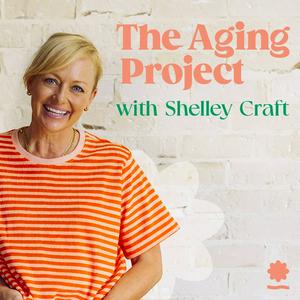The Latest on Alzheimer’s: What Every Woman Must Know with Professor Ralph Martins
For many women, memory changes during perimenopause and menopause can be unsettling. We find ourselves wondering: Is this just brain fog? Is this normal? Or could it be something more serious?
In this critical episode, Shelley Craft is joined by Professor Ralph Martins, AO, one of the world’s leading Alzheimer’s researchers, to help us separate fact from fear and to understand what’s really going on in our brains as we age.
Dementia is now the leading cause of death for women in Australia, yet so few are talking about it. This conversation is about breaking the silence, reducing fear, and creating a proactive plan to protect our brain health — starting today. Here's a snapshot of our conversation:
💡 Understanding the Disease
Why dementia is on the rise for women — and how menopause plays a role.
The difference between menopause-related memory changes and early Alzheimer’s signs
Why early prevention matters and what you can do to start reducing your risk now.
🔍 The Risks, Lifestyle, and Prevention Plan
🚩 Risk Factors We Can’t Change:
Age: Risk increases with age — but it’s not inevitable.
Family history and genetics: How much does your genetic background really increase your risk?
APOE gene: Especially the APOE4 variant, which significantly raises risk.
Menopause-specific risks: The hormonal shifts that may make women more vulnerable.
🛠️ Lifestyle Risks We Can Control:
Professor Martins unpacks what really matters in prevention:
Sleep: Why deep, quality sleep is essential for clearing toxins from the brain.
Diet: Is the Mediterranean diet still the gold standard? Which foods support brain health — and which ones should we avoid?
Weight and belly fat: Visceral fat increases risk. Practical tools like waist-to-hip ratio and DEXA scans are discussed.
Blood sugar: Why glucose instability and diabetes matters — and what blood tests to request.
Hormone health: The role of HRT, testosterone, estrogen, and progesterone in brain protection.
Gut health: The gut-brain connection and its growing importance in Alzheimer’s prevention.
Alcohol: How much is too much? Should we cut it out completely?
Exercise: Specific recommendations, including the power of strength training.
Hydration: Why drinking enough water is a simple but powerful way to support cognitive function and prevent brain shrinkage.
🔎 Signs to Watch For: What’s Normal and What’s Not
The difference between typical menopause-related forgetfulness and concerning early signs of Alzheimer’s.
Early diagnosis: Why it matters, what tests to ask for, and how genetic testing, blood tests, and imaging can help.
🚀 What’s Next in Alzheimer’s Research
The exciting development of a simple blood test for early detection.
What’s holding this research back — and what needs to change.
Insights into potential treatments and the search for a cure.
Why supplements, lifestyle choices, and a personalised prevention plan matter more than ever.
💬 Key Takeaway:Alzheimer’s doesn’t have to be inevitable — and it’s never too early (or too late) to take action.
👉 Join our FREE DNA webinar to learn more about The Fitgenes Program—register now to begin your DNA Discovery.
https://theagingproject.com/fitgenes-webinar/
👉 Join our FREE DNA webinar to learn more about The Fitgenes Program—register now to begin your DNA Discovery.
https://theagingproject.com/fitgenes-webinar/
👉 Shop our favourite brain health supplements at our sister platform: www.youmusttryit.com
Links:
Alzheimer's Research Australia
https://alzheimersresearch.org.au/research/professor-ralph-martins-ao/
Alzheimer's Network
https://www.alz-net.org/
Professor Hamid Sohrabi
https://alzheimersresearch.org.au/about-us/our-people/professor-hamid-sohrabi/
Professor Sharon Naismith - Sleep
https://www.sydney.edu.au/science/about/our-people/academic-staff/sharon-naismith.html
Maggie Beer's Recipe For Life Book
https://www.maggiebeer.com.au/products/maggie-s-recipe-for-life-cookbook
Got feedback or a question: email
[email protected]
